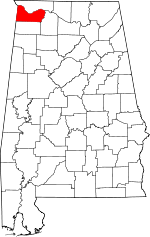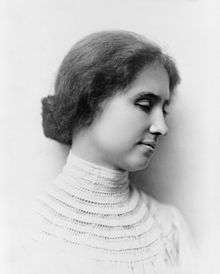Tuscumbia, Alabama
| Tuscumbia, Alabama | |
|---|---|
| City | |
|
Colbert County Courthouse in Tuscumbia | |
| Nickname(s): "Charm of the Shoals" "Tusbompton" | |
 Location in Colbert County and the state of Alabama | |
| Coordinates: 34°43′51″N 87°42′10″W / 34.73083°N 87.70278°W | |
| Country | United States |
| State | Alabama |
| County | Colbert |
| Settled | 1815 |
| Incorporated (town) | December 20, 1820[1] |
| Named for | Chickasaw Indian chief [2] |
| Government | |
| • Type | Mayor/Council |
| • Mayor | Bill Shoemaker |
| Area | |
| • Total | 8.8 sq mi (22.8 km2) |
| • Land | 8.8 sq mi (22.7 km2) |
| • Water | 0.04 sq mi (0.1 km2) |
| Elevation | 466 ft (142 m) |
| Population (2010) | |
| • Total | 8,423 |
| • Density | 963/sq mi (371.9/km2) |
| Time zone | Central (CST) (UTC-6) |
| • Summer (DST) | CDT (UTC-5) |
| ZIP code | 35674 |
| Area code(s) | 256, 938 |
| FIPS code | 01-77280 |
| GNIS feature ID | 0153743 |
| Website |
www |
Tuscumbia is a city in and the county seat of Colbert County, Alabama, United States. As of the 2010 census, the population was 8,423.[3] The city is part of The Shoals metropolitan area.
Tuscumbia was the hometown of Helen Keller (The little house). It is the location of the Alabama Music Hall of Fame.
History
Tuscumbia had its beginnings when the Michael Dixon family arrived about 1816. They traded with Chief Tucumseh for the Tuscumbia Valley and built their home at the head of the big spring. From these humble dwellings quickly developed a village known as the Big Spring Community. The men of the community requested that the state legislature incorporate them as a city.[4] The town was incorporated in 1820 as Ococoposa[1] and is one of Alabama's oldest towns. In 1821, its name was changed to Big Spring[5] and on December 22, 1822, to Tuscumbia, after the Chief Rainmaker of the Chickasaws.[4][6][7]
Although shoals on the nearby Tennessee River made the river nearly impassable, a federal highway completed in 1820 provided the area with good access to markets. Tuscumbia soon became the center for agriculture in northern Alabama.[7] A line to the town on the Tuscumbia, Courtland and Decatur Railroad was completed in 1832, and by 1850 Tuscumbia was a major railroad hub for train traffic throughout the South.[7]
Tuscumbia became the county seat for Colbert County in 1867.[2]
During the Civil War, the railroad hub made Tuscumbia a target of the Union Army, which destroyed the railroad shops and other parts of the town.
In April 1894, three African-Americans suspected of planning arson were removed from the Tuscumbia jail by a mob of 200 men who hung them from the bridge over the Tennessee River. [8]
Geography
Tuscumbia is located northeast of the center of Colbert County at 34°43′51″N 87°42′10″W / 34.73083°N 87.70278°W (34.730839, -87.702854).[9] It is bordered to the north by the city of Sheffield and to the northeast by the city of Muscle Shoals. The Tennessee River is 1 mile (1.6 km) to the northwest.
According to the U.S. Census Bureau, the city has a total area of 8.8 square miles (22.8 km2), of which 8.8 square miles (22.7 km2) is land and 0.039 square miles (0.1 km2), or 0.50%, is water.[10]
Demographics
| Historical population | |||
|---|---|---|---|
| Census | Pop. | %± | |
| 1870 | 1,214 | — | |
| 1880 | 1,369 | 12.8% | |
| 1890 | 2,491 | 82.0% | |
| 1900 | 2,348 | −5.7% | |
| 1910 | 3,324 | 41.6% | |
| 1920 | 3,855 | 16.0% | |
| 1930 | 4,533 | 17.6% | |
| 1940 | 5,515 | 21.7% | |
| 1950 | 6,734 | 22.1% | |
| 1960 | 8,994 | 33.6% | |
| 1970 | 8,828 | −1.8% | |
| 1980 | 9,137 | 3.5% | |
| 1990 | 8,413 | −7.9% | |
| 2000 | 7,856 | −6.6% | |
| 2010 | 8,423 | 7.2% | |
| Est. 2015 | 8,474 | [11] | 0.6% |
| U.S. Decennial Census[12] 2013 Estimate[13] | |||
As of the census[14] of 2010, there were 8,423 people, 3,704 households, and 2,279 families residing in the city.[3] The population density was 1,076.3 inhabitants per square mile (415.6/km2). There were 4,120 housing units at an average density of 520.7 per square mile (201.0/km2). The racial makeup of the city was 75.91% White, 21.16% Black or African American, 0.39% Native American, 0.33% Asian, 0.48% from other races, and 1.70% from two or more races. 1.37% of the population were Hispanic or Latino of any race.[3]
There were 3,704 households out of which 25.4% had children under the age of 18 living with them, 46.2% were married couples living together, 14.0% had a female householder with no husband present, and 36.6% were non-families. 34.5% of all households were made up of individuals and 17.5% had someone living alone who was 65 years of age or older. The average household size was 2.19 and the average family size was 2.81.[3]
In the city the population was spread out with 21.64% under the age of 18, 6.20% from 18 to 24, 30.15% from 25 to 44, 19.50% from 45 to 64, and 21.9% who were 65 years of age or older. The median age was 42 years. For every 100 females there were 83.6 males. For every 100 females age 18 and over, there were 78.6 males.[3]
The median income for a household in the city was $28,793, and the median income for a family was $39,831. Males had a median income of $32,159 versus $18,860 for females. The per capita income for the city was $18,302. About 11.1% of families and 15.1% of the population were below the poverty line, including 21.7% of those under age 18 and 19.92% of those age 65 or over.[3]
Education
Tuscumbia City Schools and the Colbert County Board of Education provide public education for Tuscumbia. The following public schools are located in Tuscumbia:
- Deshler Area Vocational Center (grades 9 through 12)
- Deshler High School (grades 9 through 12)
- Colbert Heights High School (grades 7 through 12)
- Deshler Middle School (grades 6 through 8)
- Colbert Heights Elementary School (grades K through 6)
- New Bethel Elementary (grades K through 6)
- R. E. Thompson Intermediate School (grades 3 through 5)
- G. W. Trenholm Primary School (grades K through 2)
Private schools in Tuscumbia include Covenant Christian School (grades K through 12).
Media
Radio stations:
- WVNA 1590 AM (News/Talk)
- WZZA 1410 AM (Urban contemporary)
Notable people
- Cynthia Bailey, housewife on The Real Housewives of Atlanta
- Beverly Barton, novelist
- Deion Belue, cornerback for the Jacksonville Jaguars
- John A. Caddell, lawyer and former president of the Alabama Bar Association
- Archibald Hill Carmichael, former U.S. Representative from 1933 to 1937
- Mike Cooley, guitarist for the alt-country/rock band Drive-By Truckers
- James Deshler, Confederate brigadier general during the American Civil War
- Al Gamble, session musician
- Howell Thomas Heflin, former U.S. senator from Alabama (1979–97), former Alabama Supreme Court Chief Justice (1971–77)
- Richard H. Jackson, former four-star admiral in the United States Navy
- Helen Keller, deafblind author, activist, lecturer, and socialist
- Robert B. Lindsay, 22nd Governor of Alabama
- Frank Manush, former Major League Baseball third baseman for the Philadelphia Athletics
- Heinie Manush, member of the Baseball Hall of Fame[15]
- Jimmy Orr, former National Football League wide receiver
- Margaret Pellegrini, played one of the Munchkins in the movie The Wizard of Oz
- Billy Pettinger, songwriter, painter and author
- Will Reynolds, mass murderer
- William Henry Sawtelle, United States federal judge from 1931 to 1934
- William H. Steele, member of the United States District Court for the Southern District of Alabama
- Larry Stutts, State Senator whose care as a doctor inspired "Rose's Law"
- Wilson D. Watson, United States Marine Corps private who received the Medal of Honor for his actions on Iwo Jima during World War II
- Robert T. Norwood, international eating competitor three time world kale eating champion, inventor of pizza in a cup
References
- 1 2 Acts Passed at the Second Session of the General Assembly of the State of Alabama. Ococoposa, Chickasaw which means dry watermelon Begun and held in the Town of Cahawba, on the first Monday in November, one thousand eight hundred and twenty (1820). Cahawba, Alabama: Printed by Allen & Brickell, State Printers in 1820. Page 94. "An Act to incorporate the town of Ococoposo in the County of Franklin...Approved, December 20, 1820."
- 1 2 "Our History". City of Tuscumbia Web site. Retrieved 21 January 2010.
- 1 2 3 4 5 6 "Fact Sheet- Tuscumbia city, Alabama". American Fast Facts. United States Census Bureau. Retrieved 21 January 2010.
- 1 2 Deshler High School Yearbook, Tiger's Roar 1996 Volume LXVI, 175 Years Ago by John McWilliams. pg. 51
- ↑ Acts Passed at the Called Session of the General Assembly of the State of Alabama Begun and Held in the Town of Cahawba, on the First Monday in June, One Thousand Eight Hundred and Twenty One (1821). Cahawba, Alabama: Printed by Allen & Brickell, State Printers. Reprint by Statute Law Book Co., Washington, D.C. Nov. 1913. Page 40. "To change the name of Ococoposa, and for other purposes...Approved, June 14, 1821"
- ↑ Acts Passed at the Fourth Annual Session of the General Assembly of the State of Alabama, Begun an Held at the Town of Cahawba, On the third Monday of November, one thousand eight hundred and twenty two (1822). Cahawba, Alabama. Printed by William B. Allen and Co., Printers to the State. Jan. 1823. Page 131. "Act - Changing the name of Big-Spring in Franklin County...Approved, Dec. 31, 1822."
- 1 2 3 Thornton, Linda (December 10, 2009). "Tuscumbia". Encyclopedia of Alabama. Retrieved 21 January 2010.
- ↑ "Triple Lynching at Tuscumbia". The Atlanta Constitution. 23 April 1894.
- ↑ "US Gazetteer files: 2010, 2000, and 1990". United States Census Bureau. 2011-02-12. Retrieved 2011-04-23.
- ↑ "Geographic Identifiers: 2010 Demographic Profile Data (G001): Tuscumbia city, Alabama". U.S. Census Bureau, American Factfinder. Retrieved June 9, 2014.
- ↑ "Annual Estimates of the Resident Population for Incorporated Places: April 1, 2010 to July 1, 2015". Retrieved July 2, 2016.
- ↑ "U.S. Decennial Census". Census.gov. Retrieved June 6, 2013.
- ↑ "Annual Estimates of the Resident Population: April 1, 2010 to July 1, 2013". Retrieved June 3, 2014.
- ↑ "American FactFinder". United States Census Bureau. Retrieved 2008-01-31.
- ↑ Reichler, Joseph L., ed. (1979) [1969]. The Baseball Encyclopedia (4th ed.). New York: Macmillan Publishing. ISBN 0-02-578970-8.
External links
| Wikimedia Commons has media related to Tuscumbia, Alabama. |
- Official website
- Virtual Tour of Tuscumbia
- American Memory's Built in America Collection which has drawings, photographs, and descriptions of old homes and buildings in Tuscumbia
- Tuscumbia City Schools
Coordinates: 34°43′51″N 87°42′10″W / 34.730839°N 87.702854°W

